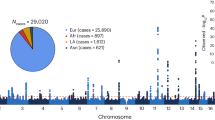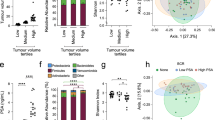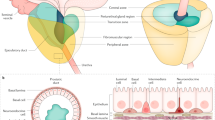Abstract
Proliferative mechanisms involving the epidermal growth factor (EGF) and transforming growth factor beta (TGF-β1) ligands are potential alternative pathways for prostate cancer (PC) progression to androgen independence (AI). Thus, the combined effect of EGF and TGFB1 functional polymorphisms might modulate tumor microenvironment and consequently its development. We studied EGF+61G>A and TGFB1+869T>C functional polymorphisms in 234 patients with PC and 243 healthy individuals. Intermediate- and high-proliferation genetic profile carriers have increased risk for PC (odds ratio (OR)=3.76, P=0.007 and OR=3.98, P=0.004, respectively), when compared with low proliferation individuals. Multivariate analysis showed a significantly lower time to AI in the high proliferation group, compared with the low/intermediate proliferation genetic profile carriers (HR=2.67, P=0.039), after adjustment for age, metastasis and stage. Results suggest that combined analysis of target genetic polymorphisms may contribute to the definition of cancer susceptibility and pharmacogenomic profiles. Combined blockage of key molecules in proliferation signaling pathways could be one of the most promising strategies for androgen-independent prostate cancer.
This is a preview of subscription content, access via your institution
Access options
Subscribe to this journal
Receive 6 print issues and online access
$259.00 per year
only $43.17 per issue
Buy this article
- Purchase on Springer Link
- Instant access to full article PDF
Prices may be subject to local taxes which are calculated during checkout

Similar content being viewed by others
References
Hsing AW, Chokkalingam AP . Prostate cancer epidemiology. Front Biosc 2006; 11: 1388–1413.
Pronzato P, Rondini M . Hormonotherapy of advanced prostate cancer. Ann Oncol 2005; 4: iv80–iv84.
Hellerstedt B, Pienta K . The current state of hormonal therapy for prostate cancer. CA Cancer J Clin 2002; 52: 154–179.
Catalona WJ . Management of cancer of the prostate. N Engl J Med 1994; 331: 996–1003.
Martín-Orozco R, Almaroz-Pro C, Rodríguez-Ubreva FJ, Cortés MA, Ropero S, Colomer R et al. EGF prevents the neuroendocrine differentiation of LNCaP Cells induced by serum deprivation: the modulator role of PI3K/Akt. Neoplasia 2007; 9: 614–624.
Long R, Morrissey C, Fitzpatrick J . Prostate epithelial cell differentiation and its relevance to the understanding of prostate cancer therapies. Clin Sci 2005; 108: 1–11.
Fisher DA, Lakshmanan J . Metabolism and effects of epidermal growth factor and related growth factors in mammals. Endocr Rev 1990; 11: 418–442.
Groenen LC, Nice EC, Burgess AW . Structure-function relationships for the EGF/TGF- family of mitogens. Growth Factors 1994; 11: 235–257.
Vicentini C, Festuccia C, Gravina GL, Angelucci A, Marronaro A, Bologna M . Prostate cancer cell proliferation is strongly reduced by epidermal growth factor receptor tyrosine kinase inhibitor ZD1839 in vitro on human cell lines primary cultures. J Cancer Res Clin Oncol 2003; 129: 165–175.
Di Lorenzo G, Tortora G, D'Armiento FP, De Rosa G, Staibano S, Autorino R et al. Expression of epidermal growth factor receptor correlates with disease relapse and progression to androgen-independence in human prostate cancer. Clin Cancer Res 2002; 8: 3438–3444.
Shahbazi M, Pravica V, Nasreen N, Fakhoury H, Fryer AA, Strange RC et al. Association between functional polymorphism in EGF gene and malignant melanoma. Lancet 2002; 359: 397–401.
Bhowmick D, Zhuang Z, Wait SD, Weil RJ . A functional polymorphism in the EGF gene is found with increased frequency in glioblastoma multiforme patients and is associated with more aggressive disease. Cancer Res 2004; 64: 1220–1223.
Costa B, Ferreira P, Costa P, Canedo P, Oliveira P, Silva A et al. Association between functional EGF+61 polymorphism and glioma risk. Clin Cancer Res 2007; 13: 2621–2625.
MacCarron S, Bateman A, Theaker J, Howell WM . EGF+61 gene polymorphism and susceptibility to and prognostic markers in cutaneous malignant melanoma. Int J Cancer 2003; 107: 673–675.
Ribeiro R, Soares A, Pinto D, Catarino R, Lopes C, Medeiros R . EGF genetic polymorphism is associated with clinical features but not malignant phenotype in neurofibromatosis type 1 patients. J Neurooncol 2007; 81: 225–229.
Teixeira AL, Ribeiro R, Cardoso D, Pinto D, Lobo F, Fraga A et al. Genetic Polymorphism in EGF is associated with prostate cancer agressiveness and progression-free-interval in androgen blockade-treated patients. Clin Cancer Res 2008; 14: 3367–3371.
Elliott R, Blobe G . Role of transforming growth factor beta in human cancer. J Clin Oncol 2005; 23: 2078–2093.
Reiss M, Barcellos-Hoft MH . Transforming growth factor-b in breast cancer: a working hypothesis. Breast Cancer Res Treat 1997; 45: 81–95.
Kretzschmar M . Transforming growth factor-b and breast cancer. Transforming growth factor-b/SMAD signaling effects and cancer. Breast Cancer Res 2000; 2: 107–115.
Grainger DJ, Heathcote K, Chiano M, Snieder H, Kemp PR, Metcalfe JC et al. Genetic control of the circulating concentration of transforming growth factor type beta1. Hum Mol Genet 1999; 8: 93–97.
Yokota M, Ichihara S, Lin TL, Nakashima N, Yamada Y . Association of a T29C polymorphism of the transforming growth factor-beta1 gene with genetic susceptibility to myocardial infarction in Japanese. Circulation 2000; 101: 2783–2787.
Soulitzis N, Karyotis I, Delakas D, Spandidos DA . Expression analysis of peptide growth factors VEGF, FGF2, TGFB1, EGF and IGF1 in prostate cancer and benign prostatic hyperplasia. Int J Oncol 2006; 29: 305–314.
Jakowlew S . Transforming growth factor-β in cancer and metastasis. Cancer Metastatis Rev 2006; 25: 435–457.
Gudmundsson J, Sulem P, Steinthorsdottir V, Bergthorsson JT, Thorleifsson G, Manolescu A et al. Two variants on chromosome 17 confer prostate cancer risk, and the one in TCF2 protects against type 2 diabetes. Nat Genet 2007; 39: 977–983.
Zheng SL, Sun J, Wiklund F, Smith S, Stattin P, Li G et al. Cumulative association of five genetic variants with prostate cancer. N Engl J Med 2008; 358: 910–919.
Haiman CA, Patterson N, Freedman ML, Myers SR, Pike MC, Waliszewska A et al. Multiple regions within 8q24 independently affect risk for prostate cancer. Nat Genet 2007; 39: 638–644.
Glinsky GV . Phenotype-defining functions of multiple non-coding pathway. Cell Cycle 2008; 7: 1630–1639.
Glinsky GV . An SNP-guided microRNA map of fifteen common human disorders identifies a consensus disease phenocode aiming at principal components of the nuclear import pathway. Cell Cycle 2008; 7: 2570–2583.
Gregory H, Willshire IR, Kavanagh JP, Blacklock NJ, Chowdury S, Richards RC . Urogastrone-epidermal growth factor concentrations in prostatic fluid of normal individuals and patients with benign prostatic hypertrophy. Clin Sci (Lond) 1986; 70: 359–363.
Harper ME, Glynne-Jones E, Goddard L, Mathews P, Nicholson RI . Expression of androgen receptor and growth factors in premalignant lesions of the prostate. J Pathol 1998; 186: 169–177.
Stearns ME, Garcia FU, Fudge K, Rhim J, Wang M . Role of interleukin 10 and transforming growth factor β1 in the angiogenesis and metastasis of human prostate primary tumor lines from orthotopic implants in severe combined immunodeficiency mice. Clin Cancer Res 1999; 5: 711–720.
Kaklamani V, Pasche B . the role of TGF-β in cancer and the potential for therapy and prevention. Expert Rev Anticancer Ther 2004; 4: 649–661.
Tang B, de Castro K, Barnes HE, Parks WT, Stewart L, Böttinger EP et al. Loss of responsiveness of to transforming growth factor beta induces malignant transformation of nontumorigenic rat prostate epithelial cells. Cancer Res 1999; 59: 4834–4842.
Bierie B, Moses H . TGF-β: the molecular jekyll and Hyde of cancer. Nat Rev 2006; 6: 506–520.
Zhou W, Park I, Pins M, Kozlowski JM, Jovanovic B, Zhang J et al. Dual regulation of proliferation and growth arrest in prostatic stromal cells by transforming growth factor-β1. Endocrinology 2003; 144: 4280–4284.
Paterson IC, Davies M, Stone A, Huntley S, Smith E, Pring M et al. TGF-b1 acts as a tumor suppressor of human malignant keratinocytes independently of Smad 4 expression and ligand-induced G1 arrest. Oncogene 2002; 21: 1616–1624.
Bierie B, Moses HL . TGF-beta and cancer. Cytokine Growth Factor Rev 2006; 17: 29–40.
Guo Y, Kyprianou N . Restoration of transforming growth factor beta signaling pathway in human prostate cancer cells suppresses tumorigenicity via induction of caspase-1-mediated apoptosis. Cancer Res 1999; 59: 1366–1371.
Medeiros R, Vasconcelos A, Costa S, Pinto D, Ferreira P, Lobo F et al. Metabolic susceptibility genes and prostate cancer risk in a southern European population: the role of glutathione S-transferases GSTM1, GSTM3, And GSTT1 genetic polymorphisms. Prostate 2004; 58: 414–420.
Medeiros R, Morais A, Vasconcelos A, Costa S, Pinto D, Oliveira J et al. The role of vitamin D receptor gene polymorphisms in the susceptibility to prostate cancer of a southern European population. J Hum Genet 2002; 47: 413–418.
Ribeiro R, Vasconcelos A, Costa S, Pinto D, Morais A, Oliveira J et al. Overexpressing leptin genetic polymorphism (−2548G/A) is associated with susceptibility to prostate cancer and risk of advanced disease. Prostate 2004; 59: 268–274.
Zheng SL, Sun J, Wiklund F, Smith S, Stattin P, Li G et al. Cumulative association of five genetic variants with prostate cancer. N Engl J Med 2008; 358: 910–919.
Dunning AM, Ellis PD, McBride S, Kirschenlohr HL, Healey CS, Kemp PR et al. A transforming growth factor β1 signal peptide variant increases secretion in vitro and is associated with increased incidence of invasive breast cancer. Cancer Res 2003; 63: 2610–2615.
Bonaccorsi L, Carloni V, Muratori M, Formigli L, Zecchi S, Forti G et al. EGF receptor (EGFR) signalling promoting invasion is disrupted in androgen-sensitive prostate cancer cells by an interaction between EGFR and androgen receptor (AR). Int J Cancer 2004; 112: 78–86.
Angelucci A, Schenone S, Gravina G, Muzi P, Festuccia C, Vicentini C et al. Pyrazolo [3,4-d] pyrimidines c-Src inhibitors reduce epidermal growth factor-induced migration in prostate cancer cells. Eur J Cancer 2006; 42: 2838–2845.
Taille A, Vacherot F, Salomon L, Druel C, Gil Diez De Medina S, Abbou C et al. Hormone-refractory prostate cancer: a multi-step and multi-event process. Prostate Cancer Prostatic Dis 2001; 4: 204–212.
Zhu M-L, Partin JV, Bruckheimer EM, Strup SE, Kyprianou N . TGF-b signaling and androgen receptor status determine apoptotic cross-talk in human prostate cancer cells. Prostate 2008; 68: 287–295.
Isaacs JT, Coffey DS . Etiology and disease process of benign prostatic hyperplasia. Prostate Suppl 1989; 2: 33–50.
Fortunel NO, Hatzfeld A, Hatzfeld JA . Transforming growth factor-beta: pleiotropic role in the regulation of hematopoiesis. Blood 2000; 96: 2022–2036.
Mullenbach R, Lagoda PJ, Welter C . An efficient salt-chloroform extraction of DNA from blood and tissues. Trends Genet 1989; 5: 391.
Acknowledgements
We thank the Liga Portuguesa Contra o Cancro—Centro Regional do Norte (Portuguese League Against Cancer); Yamanouchi—Astellas European Foundation Award for Prostate Cancer; FCT—Fundação para a Ciência e Tecnologia (PTDC/SAU-FCF/71552/2006), Portuguese governmental foundation for science and technology; this project was partially sponsored by an unrestricted educational grant for basic research in Molecular Oncology from Novartis Oncology Portugal; RR is a recipient of a Doctoral degree grant from FCT (SFRH/BD/30021/2006); ALT is a recipient of a Master degree grant from Liga Portuguesa Contra o Cancro- Programa de Apoio à Investigação Oncológica no Norte de Portugal 2008.
Author information
Authors and Affiliations
Corresponding author
Additional information
Duality of interest
The authors disclose any commercial or other associations with acknowledged institutions that might pose a conflict of interest in connection with submitted material.
Rights and permissions
About this article
Cite this article
Teixeira, A., Ribeiro, R., Morais, A. et al. Combined analysis of EGF+61G>A and TGFB1+869T>C functional polymorphisms in the time to androgen independence and prostate cancer susceptibility. Pharmacogenomics J 9, 341–346 (2009). https://doi.org/10.1038/tpj.2009.20
Received:
Revised:
Accepted:
Published:
Issue Date:
DOI: https://doi.org/10.1038/tpj.2009.20
Keywords
This article is cited by
-
Genetic polymorphisms in key hypoxia-regulated downstream molecules and phenotypic correlation in prostate cancer
BMC Urology (2017)
-
Influence of peripheral whole-blood microRNA-7 and microRNA-221 high expression levels on the acquisition of castration-resistant prostate cancer: evidences from in vitro and in vivo studies
Tumor Biology (2014)
-
Genetic variants in AR and SHBG and resistance to hormonal castration in prostate cancer
Medical Oncology (2013)
-
Influence of TGFB1+869T>C functional polymorphism in non-small cell lung cancer (NSCLC) risk
Journal of Cancer Research and Clinical Oncology (2011)
-
Association between EGF promoter polymorphisms and cancer risk: a meta-analysis
Medical Oncology (2010)



